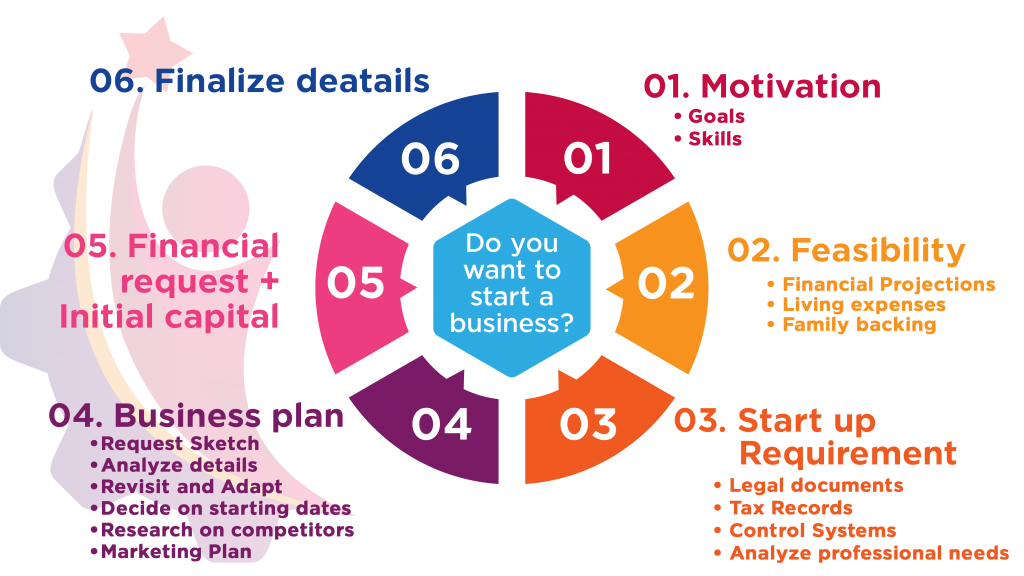In this article we will discuss the six stages of starting a business, as depicted below.
Motivation
You need to be very honest with yourself – and any co-founders – of your reasons to start a business. Is it to have independence? To become very rich? Because you have spotted something missing in the market and think you have the solution and the ability to deliver it? Or perhaps you are driven by a zeal to do something in a certain way that has never been done before. Whatever your motivation is, you need to be very clear about it with yourself, and those around you – co-founders, and also family, investors, and your core team. They are signing up for a very long haul with you, and they are counting on you to know where you are headed, and why.
Feasibility
If you are starting up a business, a feasibility study is a must. Your business will go nowhere without lots of research, critical analysis, planning and preparation. How you understand your scope, how you manage and evaluate your finances, how you understand your requirements, and how you review it will help you determine if your startup is feasible. Never take your own determination as final. Show it to people you trust, ask them to kick it around and help you find things you had missed, mistakes in your reasoning, “magical thinking” where your assumptions are wildly off or unrealistic. If you haven’t tested your hypothesis as much as possible before you get started, you could be in for some rude shocks – that could threaten the very existence of your start-up.
Start-up Requirement
You want to start a business? That’s great! After that excitement slowly fades away, it is time to break down the launch of your business into steps that are easy to handle as separate tasks. Create a to-do list of what has to be done, and you are good to go. This list may include a few factors like:
- Determining feasibility,
- Making a business plan,
- Figuring out financing,
- Identifying, reaching out to, or making a wish-list for, a founding team
- Choosing a business name,
- Obtaining business licenses and legal documents (be warned – this is never a fast process),
- Assigning responsibilities
Business Plan
Your business plan is the foundation of your business. It guides you through the stages of your business and helps it grow. There is no right or wrong way of creating a business plan. Your plan is customised for you and your business, depending on your needs. However, it is an important driver of your early success, as a business with a great plan and vision is often recognised and attracts investors. This plan may include product details, financials, founding team bios, marketing and go-to-market plans, and research on competitors. Preparing the business plan itself helps you think critically of all the details, make changes as the need arises, and to figure out key timelines, so make that business plan – think ahead!
Financial Request + Initial Capital
For any great idea to be put into action, you need money. Very few, if any, start-ups are launched by people having too much money lying around. This is where funding strategies come into play. Other than any of your own capital that you may put into your business (be careful not to stretch too far), you can also try bank loans, Venture Capital, Angel investors, grants, government or aid agency funds and the like, depending somewhat on the nature of your business. As long as you have a strong business concept that is sustainable and profitable, there will be investors waiting to invest in you.
If you keep these six steps in mind, you should have covered most of the important bases. Any form of business is risky, and start-ups are very risky – remember that most start-ups fail very soon after launch! However the nature of business itself is to take measured risks, and to manage them well – that is where the rewards lie. All the best with your venture, and remember to come back for more useful resources as you set forth on your journey!
